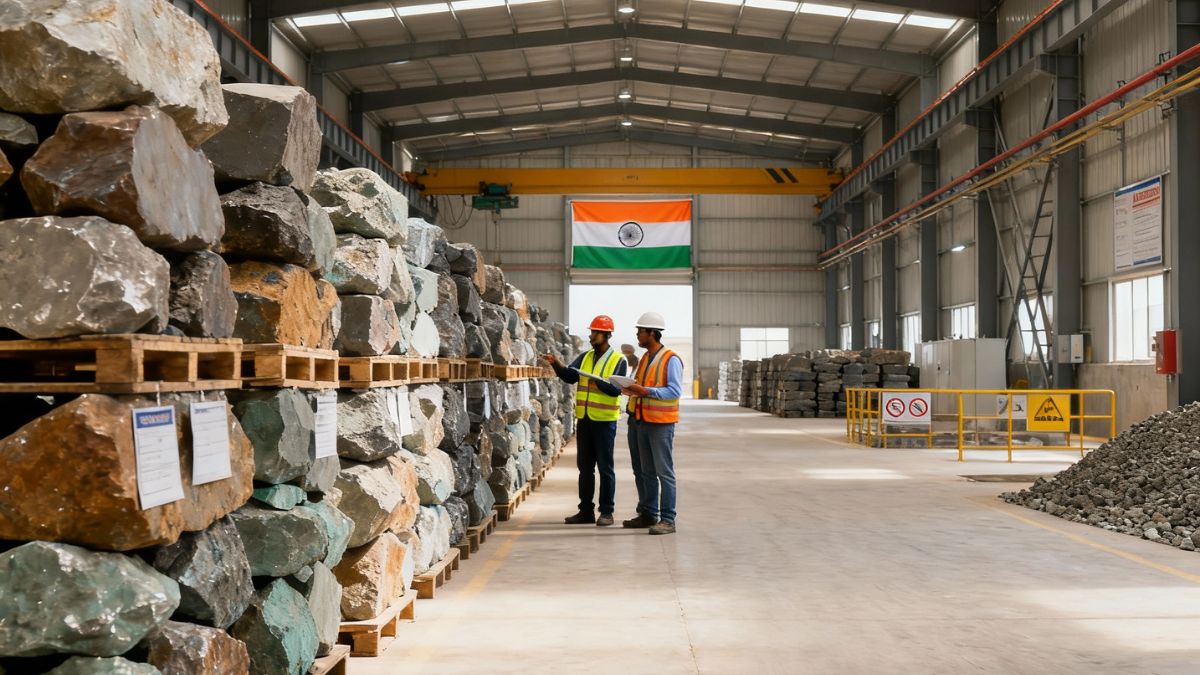India is set to launch the National Critical Mineral Stockpile (NCMS) programme to establish a strategic rare earth stockpile and strengthen supply chain security amid global disruptions caused by China’s export restrictions on critical minerals India requires for key industries. The government initiative aims to create a two-month reserve of essential minerals for electric vehicles, wind turbines, and high-tech manufacturing, marking a significant step toward reducing import dependency and ensuring mineral availability for domestic industries.
The critical minerals India stockpiles represent a crucial component of the broader National Critical Minerals Mission (NCMM), which has allocated ₹34,300 crore over seven years to secure supply chain security through domestic exploration, processing capabilities, and strategic reserves. This rare earth stockpile initiative comes as China, which controls over 90% of global rare earth processing, has imposed curbs on exports of rare earth magnets essential for clean energy and defense applications.
Critical Minerals India: Strategic Response to Supply Vulnerabilities
Import Dependency Challenges
The National Critical Mineral Stockpile addresses India’s overwhelming dependence on imports, with the country being 100% import-dependent for 10 critical minerals and heavily reliant on foreign sources for lithium (82%), bismuth (85.6%), and silicon (76%). The supply chain security initiative aims to buffer against geopolitical tensions and market disruptions that threaten India’s clean energy transition and manufacturing ambitions.
Government Implementation Strategy
A senior government official confirmed that the critical minerals India programme will initially focus on rare earth elements with active participation from private companies, later expanding to include other strategic minerals vital for the country’s energy transition. The rare earth stockpile will complement India’s ₹7,300 crore incentive scheme approved for producing 6,000 tonnes of rare earth magnets over five years, creating an integrated approach to mineral security.
Rare Earth Stockpile: Domestic Reserves and Processing Infrastructure
Abundant Natural Resources
India possesses substantial critical minerals India has reserves with approximately 7.23 million tonnes of rare earth oxide contained in 13.15 million tonnes of monazite deposits located primarily along the coasts of Andhra Pradesh, Odisha, Tamil Nadu, and Kerala. Despite these significant reserves, the country faces technological challenges in extraction and processing, leading to continued import dependence for refined materials.
Technology and Capacity Gaps
The rare earth stockpile initiative acknowledges these processing limitations while building strategic reserves to ensure supply chain security during the development of domestic capabilities. The Geological Survey of India has augmented 482.6 million tonnes of rare earth element ore resources through 34 exploration projects, while the Ministry of Mines has successfully awarded 34 out of 55 critical mineral blocks through five auction tranches.
Supply Chain Security Through National Mission Framework
Comprehensive Policy Architecture
The National Critical Mineral Stockpile operates within the comprehensive NCMM framework, which has identified 24 critical minerals essential for India’s economic and strategic interests. The mission encompasses seven key components, including exploration, overseas acquisitions, recycling, human resource development, and supply chain security through strategic reserves and processing capabilities.
Financial Allocation and Private Participation
Under the NCMM, ₹500 crore has been specifically earmarked to guard against supply disruptions and ensure mineral availability for domestic use, supporting the critical minerals India strategy. The rare earth stockpile programme will be designed with private sector participation to ensure adequate reserves while promoting industrial involvement in mineral security initiatives.
International Partnerships for Enhanced Supply Chain Security
Global Collaboration Networks
India is actively pursuing international collaborations to enhance supply chain security and reduce dependence on Chinese sources through partnerships with Australia, Japan, the United States, Argentina, Bolivia, and Chile. The country has signed memorandums of cooperation for critical mineral supply chains and joined the Mineral Security Partnership (MSP), a strategic multinational coalition focused on diversifying supply sources.
Strategic Asset Acquisition
Khanij Bidesh India Ltd. (KABIL) has facilitated asset purchases and exploration agreements across multiple countries, including a $24 million lithium exploration pact with Argentina and ongoing negotiations with African nations. These international partnerships complement the National Critical Mineral Stockpile by ensuring multiple supply sources while domestic capabilities develop.
Defense Applications of Critical Minerals India Strategy
Strategic Defense Requirements
The critical minerals India stockpiles will serve crucial defense manufacturing requirements, with Defense Production Secretary Rajesh Kumar Singh announcing plans for a strategic reserve to ensure uninterrupted supply during defense production surges. The rare earth stockpile will support manufacturing of advanced defense systems, missiles, and electronic warfare equipment that rely heavily on rare earth magnets and specialised minerals.
Atmanirbhar Bharat Integration
The strategic reserve will help tide over immediate requirements during emergencies while supporting India’s defense manufacturing ambitions under the Atmanirbhar Bharat initiative. This dual-use approach ensures supply chain security for both civilian clean energy applications and critical defense manufacturing needs.
Economic Impact and Future Outlook for Supply Chain Security
Industrial Growth Enabler
The National Critical Mineral Stockpile supports India’s goal of becoming the world’s third-largest economy by securing mineral inputs essential for clean energy, electronics, and advanced manufacturing sectors. The initiative will create employment opportunities across exploration, processing, and manufacturing while reducing foreign exchange outflows currently spent on mineral imports.
Long-term Self-Reliance Strategy
Industry experts emphasise that while stockpiling is crucial for supply chain security, India must simultaneously invest in processing technologies and domestic extraction capabilities to achieve long-term self-reliance in critical minerals in India. The rare earth stockpile provides a strategic buffer while these technological capabilities develop, ensuring uninterrupted supply for India’s industrial growth and energy transition objectives.

























